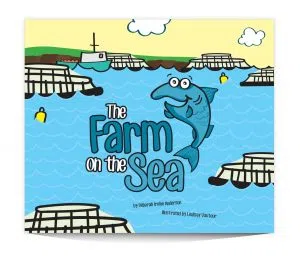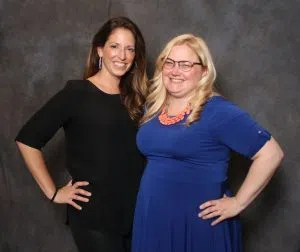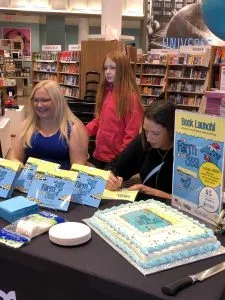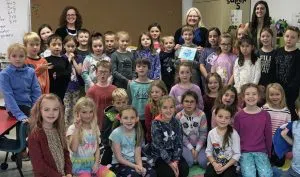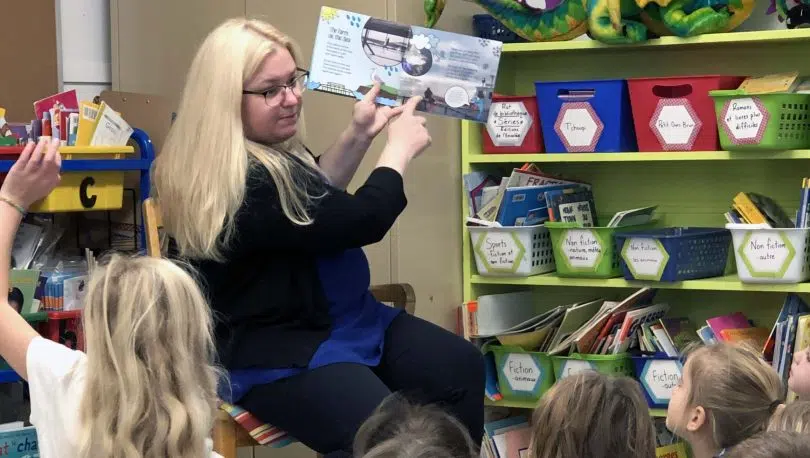
Deborah Irvine Anderson reads to students at Quispamsis Elementary School. Image: submitted.
When people think of industries in New Brunswick, oil, forestry and potatoes come to mind most often. Deborah Irvine Anderson wants to add one more to that list: salmon farming.
So, she did what anyone with years of experience in journalism would do: she wrote a book to help educate kids – and adults too – who don’t understand the important role aquaculture plays in the provincial economy.
The idea for The Farm on the Sea, which follows Sunny the Salmon as Sunny guides the reader through the farming process, came to her after touring a local farm.
“It was one of those experiences where I learned so much,” she says. “I really had no idea how it worked, and my daughter learned so much and she was really into it.”
After this trip to a salmon farm, Anderson quickly became passionate about the industry.
“Canada is the fourth-largest producer of Atlantic salmon in the world,” says Anderson, “and most of that [industry] is in New Brunswick.”
Yet despite the importance of the industry, she recognized a small problem.
“I realized kids don’t know about salmon farming. I didn’t know about salmon farming and I’m an adult,” she says.
Anderson reached out to some colleagues who had previously worked in the industry to help her write the book – Kathy Kaufield, the book’s editor and a long-time journalist herself, and Lyndsay Vautour, a local artist and graphic designer.
“I approached them and said, ‘I really think we should write a book. There’s a real need for it and I think it’s a really fascinating story.’ They were like, ‘yeah let’s do it.'”
Anderson also partnered with the Atlantic Canada Fish Farmers Association (ACFFA).
“They have a mandate to educate people about salmon farming and I want to educate people on salmon farming, so it just made sense,” says Anderson.
- Farm On The Sea. Illustrator: Lindsay Vautour.
- Illustrator Lindsay Vautour and author Deborah Irvine Anderson. Image: submitted.
- Book reading and signing at Indigo. Image: Kathy Kaufield.
- Deborah Irvine Anderson with students at Quispamsis Elementary School. Image: Kathy Kaufield.
Anderson consulted widely in the writing and editing process, work-shopping drafts with kids and adults.
“It turns out creating a children’s book looks a lot easier than it is, especially when you’re used to writing for adults and working with adults,” she says.
“My children got read to and got to read a lot of iterations … I [also] talked to some of their teachers and said, ‘would this be interesting? Do you think this is something that kids would like?’ They said, ‘absolutely, kids are really interested in nonfiction, kids like learning about how things work and they like learning about the natural world around them.’ Those are all things that are part of the curriculum in Grades 2-3 in New Brunswick.”
Two years in the making, the book is now published and she says the feedback has been incredible.
“We are getting attention for this book from all over the world, which says to me that there is a real thirst for this knowledge and a need for it to be communicated,” she says. “We have gotten orders from Norway, Chile, Scotland, Spain, New York, and British Columbia.”
Anderson also hopes that this book will be for more than just kids.
“It’s a fact-based educational resource for children and parents,” she says. “I keep getting feedback from parents saying [they] learned a lot reading this book.”
Susan Farquharson, executive director of the ACFFA, says the timing is right for a book like this.
“It’s a large industry, but overall it’s a relatively new industry,” she says. “It’s about 40 years old and so it’s a young industry [by comparison]. It’s nice to see this book finally being developed.”
Proceeds from the book are going to the CBC Harbour Lights Campaign that raises money for food banks in southern New Brunswick.
Anderson also hopes that this book inspires more educational initiatives on the salmon farming industry, which she says is crucial to the future of sustainable seafood consumption.
“It’s hopefully paving the way in other countries too because aquaculture is the way of the future on how we sustainably feed the world.”
A version of this story was published in Huddle, an online business news publication based in Saint John. Huddle is an Acadia Broadcasting content partner.


